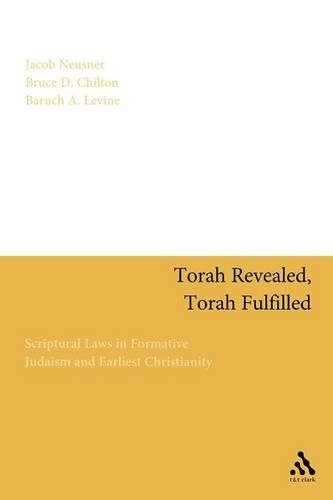
Torah Revealed, Torah Fulfilled: Scriptural Laws In Formative Judaism and Earliest Christianity
(Paperback, NIPPOD)
Available Formats
Publishing Details
Torah Revealed, Torah Fulfilled: Scriptural Laws In Formative Judaism and Earliest Christianity
By (Author) Rabbi Jacob Neusner
By (author) Bruce D. Chilton
By (author) Dr. Baruch A. Levine
Bloomsbury Publishing PLC
T.& T.Clark Ltd
3rd November 2011
NIPPOD
United Kingdom
Classifications
Tertiary Education
Non Fiction
Criticism and exegesis of sacred texts
Judaism
220.6
Physical Properties
Paperback
256
Description
The authors seek to identify the recurrent tensions, the blatant points of emphasis, the recurring indications of conflict and polemic. Framing the issue of the disposition of the Scriptural heritage in broad terms, they describe what characterizes the Gospels and the Mishnah, the letters of Paul and the Tosefta. In other words, if they take whole and complete the writings of first and second century people claiming to form the contemporary embodiment of Scripture's Israel and ask what they all stress as a single point of insistence, the answer is self-evident. Nearly every Christianity and nearly all known Judaisms appeal for validation to the Scriptures of ancient Israel, their laws and narratives, their prophecies and visions. To Scripture all parties appeal - but not to the same verses of Scripture. In Scripture, all participants to the common Israelite culture propose to find validation - but not to a common theological program subject to diverse interpretation. From Scripture, every community of Judaism and Christianity takes away what it will, but not with the assent of all the others.
Author Bio
Jacob Neusner is the author or editor of over 700 books including The Incarnation of God: The Character of Divinity in Formative Judaism.
Bruce Chilton, New Testament and Judaic scholar, is Bernard Iddings Bell Professor of Religion at Bard College, Annandale-on-Hudson, NY. He is a co-author of The Body of Faith (Trinity), God in the World (Trinity), and Comparing Spiritualities (Trinity).
